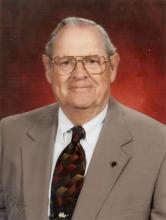 48MD
48MD
What is your hometown?
I was born in Monmouth, IL, but was raised in Davenport, IA and practiced medicine there. I am now retired and currently reside in Jacksonville, FL.
What is your official title?
Erling Larson Jr., M.D., F.A.C.P., Retired
How/when did you become interested in science and medicine?
I have been interested in science since early childhood, and loved reading books on science. My greatest influences in becoming a doctor were our family physicians, Dr. Louis Kornder and Dr. Hyman Hurevitz (28BS, 30MD, 33R-Internal Medicine).
Please highlight your major career achievements, awards, discoveries, etc.
I was the co-founder of Internal Medicine Associates in Davenport, IA, an Adjunct Associate Professor in Internal Medicine for the University of Iowa from 1976 to 1992 as well as the Internal Medicine Residency Program Instructor in Davenport, Iowa. I also published many journal articles in the internal medicine field, was the Chairman of IMPAC, a delegate to the American Medical Association and a member of the American Society of Internal Medicine and Iowa Clinical Medical Society from 1966 to 1992.
I have served as Director of the University of Iowa Foundation Board (1973-78), Chairman of that Board (1978-81), and was named the Lifetime Honorary Director in 1981. I was also the National Chairman of President’s Club of the University of Iowa from 1984 to 1988. I served on the Admissions Committee for the University of Iowa College of Medicine from 1975 to 1978 and was named an honorary member of Alpha Omega Alpha. I was given the Finkbine Award for Learning, Leadership and Loyalty in 1979, as well as awarded the Distinguished Alumni Achievement Award from the University of Iowa in 1983.
I was the President of the Scott County (1969) and Iowa Medical (1983-84) Societies, named Iowa Internist of the Year, chairman for the American Cancer Society - Scott County Chapter from 1959 to 1961 and served on the Board of Governors - Arthritis Foundation - Iowa Chapter from 1962 to 1969. I also served in the United States Navy holding the following positions: Apprentice Seaman and Cadet (July 1943-January 1946); Lieutenant, JG (October 1948-July 1950); Lieutenant, SG (July 1953-October 1954).
Is there a teacher, mentor or University of Iowa Carver College of Medicine faculty member who has helped shape your education?
There were two primary influences on my career while studying at Iowa, Dr. William Bean and Dr. Lewis January. Dr. Robert Hardin (35BS, 37MD) and Dr. Willis Fowler (26MD) were also giants in their field and important to my choice of internal medicine.
How or why did you choose the University of Iowa for your education and medical training?
Growing up in Davenport, I always had a desire to attend the University of Iowa, and even felt sorry for friends whose parents sent them to school back East.
What kind of professional opportunities or advantages has your University of Iowa medical training provided?
I firmly believe that many of the opportunities I have had throughout my career were a direct result of graduating from the University of Iowa, and the respect that is afforded its medical programs.
Please describe your professional interests.
I enjoyed all aspects of my career, but I particularly have enjoyed being involved in teaching residents.
What are some of your outside interests?
Rotary Club, Order of Saint Luke the Physician, volunteer prayer minister with Christian Healing Ministries, golf, time with family- my wife, Jan Larson, M.D. (83MD), my four children and ten grandchildren, reading, and politics.
Do you have an insight or philosophy that guides you in your professional work?
My philosophy is that a physician’s primary loyalty and concern must always be for the patient.
If you could change one thing about the practice or business of medicine, what would it be?
I believe I would have all health insurance companies and hospitals be non-profit, as in the early days of Blue Cross-Blue Shield, and thus serve as a public trust.
What is the biggest change you've experienced in medicine since you were a student?
Three notable changes I have witnessed are an increase in sub-specialization, emergency room physicians, and cell-phone technology allowing ease of contact.
What one piece of advice would you give to today's medical students?
Because the government and insurance companies may increasingly depersonalize the practice of medicine, the only way to keep medicine both an art and a science is to keep one’s loyalty and commitment always to the patient first.
What do you see as "the future" of the medicine?
Unfortunately, I see increasing regulation and depersonalization, but I still believe it is the greatest profession on earth. Despite everything, I would never discourage anyone from entering this field.